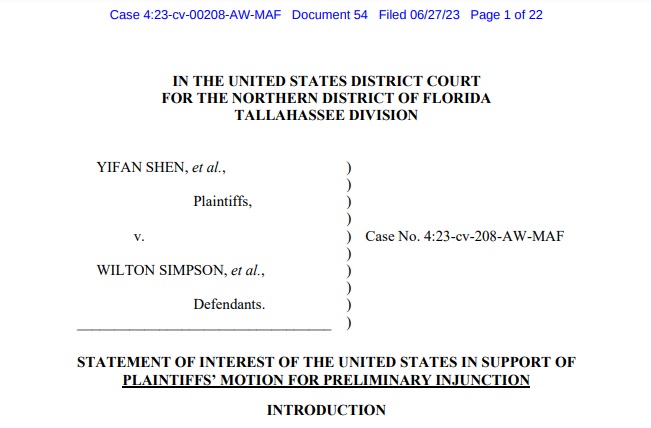Florida’s Controversial New Law: Limitations of Foreigners Acquiring Real Property
Thu Jul 6, 2023 on Florida Real Estate & News

As of July 1, 2023, Florida’s recently enacted legislation, SB264, restricts certain foreigners from buying or owning Florida real estate. Specifically, the new law, codified in Florida Statutes 692.202-204, provides land ownership restriction, prohibiting “foreign principals” from owning or acquiring agricultural land or real property within ten miles of any military installation or critical infrastructure facility, foreign principals include individuals who live in a “foreign country of concern” and who are not U.S. citizens or lawful permanent residents. An exception allows foreign principals who have a valid non-tourist visa or who have been granted asylum to purchase one residential real property not two acres in size and not within five miles of a military installation. Existing owners and new purchasers who fall into the “foreign principal” definition are required to register real property on or within 10 miles of any military installation or critical infrastructure facility.
Who are the Impacted Communities?
Which foreign countries are “countries of concern”? The People’s Republic of China, the Russian Federation, The Islamic Republic of Iran, the Democratic People’s Republic of Korea, the Republic of Cuba, the Venezuelan regime of Nicolas Maduro, or the Syrian Arab Republic as well as any agency or other entity having significant control of such foreign countries.
The second set of restrictions specifically prohibits the purchase or acquisition of real property by the People’s Republic of China. In addition to the Chinese government, Chinese companies, and Chinese citizens, are prohibited from purchasing or acquiring real property in Florida except for a natural person with a valid non-tourist visa or has obtained asylum and has the same registration requirement as the other foreign principals. Investors from other countries of concern are prohibited from acquiring property with ten miles of a military installation or critical infrastructure facility, or any agricultural land. While there are a few exceptions for indirect holdings through public securities, this legislation has far-reaching implications. The difference between the Chinese prohibition from purchasing real property in Florida and the foreign countries of concerns is the Act’s penalties for noncompliance are greater for Chinese citizens as a Chinese buyer would be guilty of a third-degree felony, punishable up to 5 years in prison and a $5,000.00 fine while seller would be guilty of committing a first-degree misdemeanor, punishable up to a year in jail and a $1,000.00 fine. Foreign principals or property sellers who violate the first set of restrictions may be charged with a second-degree misdemeanor.
What are the implications of this legislation?
For one, it may be difficult to regulate all land acquisitions or ownership of Florida real property from Chinese companies, for instance, if the Chinese company has a small ownership interest a private corporation or fund that purchases the real property or another U.S. company that obtains or owns real property in Florida. This purchase or ownership may violate the law which is a felony.
Further, questions arise as to the verification that the real estate transaction itself complies with this Act. This new Act requires each buyer to provide an affidavit confirming that the purchaser is not prohibited from buying property and is in compliance. While a title agent or real estate title insurance company cannot be imputed with knowledge that one of the foreign entities listed are violating Florida law, this Act now requires real estate title agents and companies to obtain this affidavit in order to verify that the agent has no actual knowledge of a violation of the Act.
Perhaps most compelling, however, is that in response to this new law, the American Civil Liberties Union (ACLU) filed a federal lawsuit in the U. S. District Court for the Northern District of Florida, in which the United States Department of Justice filed a Statement of Interest in support of the Plaintiffs’ Motion for Preliminary Injunction, claiming that the law is unconstitutional, as it violates the Equal Protection Clause of the Fourteenth Amendment and violates the Fair Housing Act. Two of the five Plaintiffs, one of whom is a Chinese national who already signed a residential contract where the Orlando property is within five miles of a military site and ten miles from a critical infrastructure facility, while the other Plaintiff, who has applied for political asylum is prohibited from purchasing his desired property in Orlando because he signed a contract to buy a home within 10 miles of a critical infrastructure facility. The Justice Department, citing the Fair Housing Act and the Equal Protection Clause, indicated that the new law was violative because it discriminates against a potential sale of real property because of one’s national origin.
Until there is a decision by the federal court, there is confusion as to whether SB264 could violate a real estate agent’s code of ethics. The National Association of Realtors sets forth that its members cannot refuse to work with people based upon race, color, national origin, and other identifying factors. The new law which prohibits specific groups of people from buying real property in Florida contradicts this ethical code of conduct.
Additionally, foreign investment in South Florida real property has been constant. China topped the Miami Association of Realtors’ list of countries whose residents were searching for Miami homes this past April, and it was No. 2 in March. SB264, regardless of the Court’s ultimate decision as to its constitutionality, has created a stir, and will impact the overall number of real property transactions which, in turn, may filter into slowing down the overall Florida housing market.
What does this all mean?
Until such time as the Federal Court rules on the constitutionality of SB264, this law is effective, and will likely place a drag on residential real estate prices in South Florida for the next several months.
Roy Oppenheim
From The Trenches
originally posted at: https://southfloridalawblog.com/floridas-controversial-new-law-limitations-of-foreigners-acquiring-real-property/


